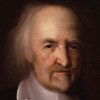“ Falsity is said not to be proper to sense, since sense is not deceived as to its proper object. ”
Thomas Aquinas, Summa Theologica (1274). copy citation
| Author | Thomas Aquinas |
|---|---|
| Source | Summa Theologica |
| Topic | falsity senses |
| Date | 1274 |
| Language | English |
| Reference | |
| Note | Translated by Fathers of the English Dominican Province |
| Weblink | http://www.gutenberg.org/cache/epub/17611/pg17611-images.html |
Context
“Since, however, sense is sometimes affected erroneously of that object, it follows that it sometimes reports erroneously of that object; and thus we are deceived by sense about the object, but not about the fact of sensation.
Reply Obj. 2: Falsity is said not to be proper to sense, since sense is not deceived as to its proper object. Hence in another translation it is said more plainly, "Sense, about its proper object, is never false." Falsity is attributed to the imagination, as it represents the likeness of something even in its absence.”
source



